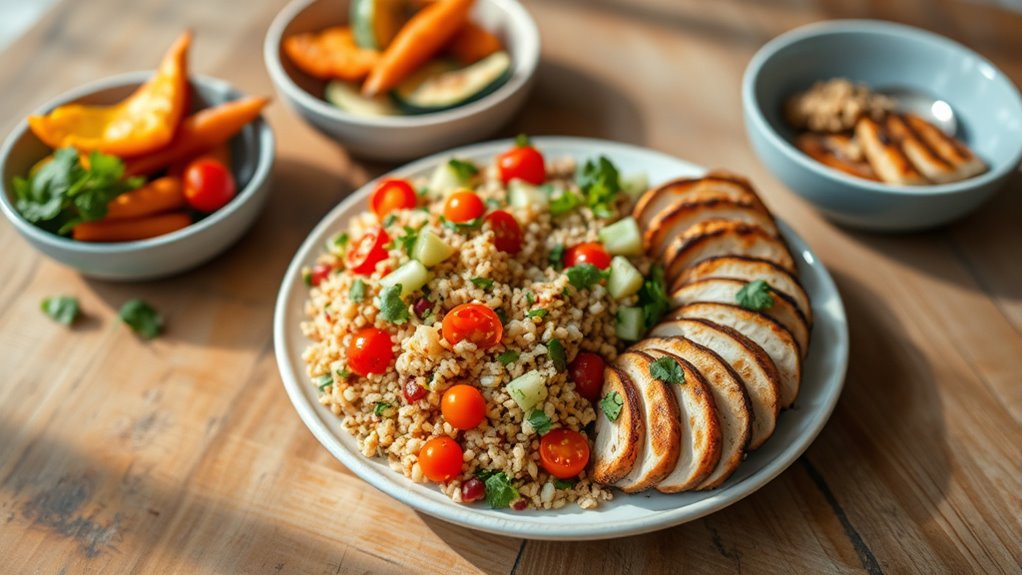The flexitarian diet helps you balance plant-based foods with moderate amounts of animal proteins, making it easier to enjoy variety without strict restrictions. You can reduce meat portions, limit meat days, and incorporate more fruits, vegetables, beans, and grains into your meals. This approach promotes better health, supports environmental sustainability, and saves money. If you’re curious about how to make these changes work for you, there’s more to explore.
Key Takeaways
- The flexitarian diet emphasizes primarily plant-based foods with moderate, flexible animal protein intake.
- It encourages reducing meat portions, limiting meat to a few days weekly, and substituting with plant proteins.
- Balancing plant and animal foods promotes health benefits like improved heart health and higher fiber intake.
- The diet supports environmental sustainability by lowering greenhouse gas emissions and resource consumption.
- Flexitarianism offers a sustainable, enjoyable approach to eating that is adaptable and easier to maintain long-term.

Are you looking for a flexible way to improve your diet without giving up meat entirely? The flexitarian diet might be just what you need. It’s designed to help you enjoy the benefits of plant-based eating while still including animal proteins in moderation. This approach allows you to enjoy the plant-based benefits—like improved heart health, better digestion, and increased intake of vitamins and fiber—without the strict restrictions of vegan or vegetarian diets. Instead, it encourages gradual changes, making it easier to stick with over the long term.
One of the key aspects of the flexitarian diet is implementing meat reduction strategies that fit your lifestyle. You don’t have to cut out meat completely; instead, you can start by reducing portion sizes, limiting meat to a few days a week, or substituting plant-based proteins like beans, lentils, tofu, or tempeh in your meals. These strategies help you maintain variety and taste while cutting back on animal products. Over time, you may find yourself naturally gravitating toward more plant-based options, which can lead to health improvements and a lighter environmental footprint.
The beauty of this diet lies in its flexibility. You can enjoy a juicy burger or a steak on occasion while primarily focusing on plant-based foods during the week. This approach makes it more sustainable because you don’t feel deprived or restricted. Instead, you’re actively choosing to incorporate more vegetables, grains, nuts, and seeds into your meals, which can boost your energy levels and support overall wellness. Plus, making small, consistent changes is often easier than drastic overhauls, increasing your chances of long-term success.
In addition to health benefits, practicing meat reduction strategies aligns with a desire to reduce your environmental impact. Livestock production is a significant contributor to greenhouse gases, land use, and water consumption. By choosing to eat less meat, even occasionally, you’re contributing to a more sustainable food system. Research shows that incorporating high-quality projectors can enhance your viewing experience, and similarly, adopting a flexitarian approach can improve your overall lifestyle. This shift can also be financially beneficial, as plant-based proteins tend to be more affordable than meat, helping you save money while making healthier choices.
Ultimately, the flexitarian diet offers a realistic, balanced approach that respects your preferences and lifestyle. It empowers you to enjoy the flavors and nutrients of both plant-based and animal foods, fostering a healthier, more sustainable way of eating. Whether your goal is to improve your health, reduce your environmental footprint, or simply explore new culinary options, adopting meat reduction strategies within a flexitarian framework can be a rewarding and manageable journey.
Frequently Asked Questions
How Do I Ensure Adequate Nutrient Intake on a Flexitarian Diet?
To guarantee adequate nutrient intake on a flexitarian diet, focus on diverse nutrient sources like legumes, whole grains, vegetables, fruits, and lean meats or dairy. Incorporate supplementation strategies if needed, such as vitamin B12 or iron supplements, especially if plant-based sources are limited. Regularly review your diet to prevent deficiencies, and consider consulting a healthcare professional or dietitian for personalized guidance.
Can I Still Enjoy Processed Meats Occasionally?
Think of your diet as a garden—you can enjoy a few weeds without ruining the whole. Yes, you can occasionally indulge in processed meats, but do so mindfully. Opt for meat alternatives like plant-based options when possible, and choose healthier snack options to balance your intake. Moderation keeps your diet diverse and satisfying while helping you maintain your health and enjoy your favorite flavors responsibly.
What Are the Environmental Benefits of a Flexitarian Lifestyle?
By adopting a flexitarian lifestyle, you help promote sustainable agriculture and reduce greenhouse gas emissions. Your choice to eat more plant-based foods supports eco-friendly farming practices, conserving resources and lowering pollution. When you limit meat consumption, you lessen the environmental impact of livestock production, contributing to a healthier planet. These small changes in your diet can lead to significant environmental benefits by balancing your nutrition and protecting the environment.
How Does a Flexitarian Diet Compare Cost-Wise to Other Diets?
Imagine your grocery cart as a canvas—on a flexitarian diet, it’s more budget-friendly than many others. You save by meal planning wisely, focusing on affordable plant proteins and limited meat purchases. Grocery shopping becomes less costly because you buy in bulk and avoid expensive processed foods. Compared to strictly vegetarian or omnivorous diets, your flexible approach balances quality and price, making healthy eating accessible without breaking the bank.
Are There Specific Health Conditions That Benefit Most From This Diet?
You’ll find that a flexitarian diet benefits your heart health and digestive health the most. By reducing red meat intake and increasing plant-based foods, you lower your risk of heart disease and improve digestion. This diet can help manage conditions like hypertension and high cholesterol, while also supporting weight management. If you’re looking for a flexible way to boost overall wellness, this approach actively promotes healthier heart and digestive systems.
Conclusion
So, you’ve decided to walk the tightrope between beef and broccoli—welcome to the flexitarian club! Who knew that sneaking in a veggie here and there could make you feel so morally superior, all while still enjoying that juicy burger? It’s the perfect way to pretend you’re saving the planet while secretly craving a steak. Keep balancing, keep pretending, and remember: in the world of flexitarians, moderation is just a fancy way to have your cake and eat it too.









